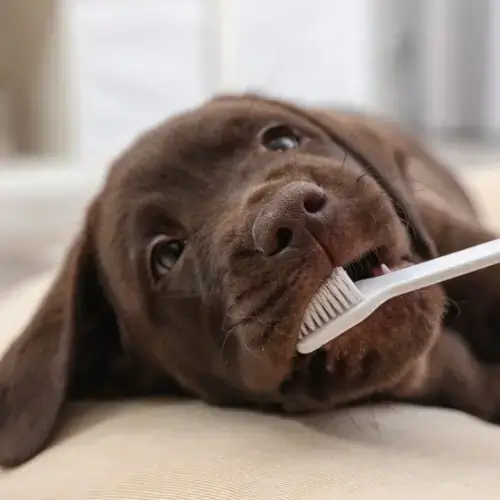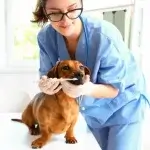Home / Compare Pet Insurance / Dental cleaning for dogs

Key takeaways
- Regular dental cleaning is crucial for your dog’s overall health, as dental disease can lead to severe issues such as infections, pain, tooth loss, and even damage to internal organs.
- Watch for symptoms like bad breath, difficulty eating, red or bleeding gums, excessive drooling, loose teeth, and changes in behaviour. Regular vet check-ups and a proper diet can help prevent dental issues and ensure long-term healthy teeth.
- At-home care is highly recommended, such as brushing your dog’s teeth, using dental chews, and adding water additives. However, regular professional dental checks and cleanings are also necessary to remove tartar and plaque from hard-to-reach areas.
Why is dental care important for dogs
 Good oral hygiene is essential to your dog’s overall health as dental disease can lead to serious health issues. Fortunately, regular dental cleaning can prevent or reduce the risk of dental problems.
Good oral hygiene is essential to your dog’s overall health as dental disease can lead to serious health issues. Fortunately, regular dental cleaning can prevent or reduce the risk of dental problems.
Dental health is just as important for dogs as it is for humans. Without proper oral care, dogs may experience:
- Periodontal disease: This is the most common dental issue in dogs, leading to gum inflammation, tooth loss, and even heart or kidney problems.
- Bad breath (Halitosis): This is often a sign of plaque buildup or gum disease.
- Pain and discomfort: A dog with dental issues may have difficulty eating, chewing, or playing and could be in constant discomfort.
- Tartar and plaque buildup: Plaque can harden into tartar, which only professional cleaning can remove.
Preventing these issues with regular cleaning can improve your dog’s quality of life and prevent expensive trips to the animal hospital.
Signs your dog needs dental cleaning
Dog owners must periodically check their dog’s dental health and watch for signs that could signal a need for dental cleaning. These include:
- Bad breath: A foul odour that doesn’t improve with regular brushing.
- Difficulty eating or chewing: Your dog might drop food, avoid hard treats, or show signs of discomfort while eating.
- Red or bleeding gums: Gums should be pink and healthy, so red, swollen, or bleeding gums may indicate an infection.
- Excessive drooling: An increase in drooling within a short time, especially if paired with a foul odour, could indicate a problem with your dog’s dental health.
- Loose teeth: Teeth that feel loose or wobble are signs of severe dental disease.
- Pawing at the mouth: Dogs may try to paw at their mouth if they are experiencing pain.
- Behaviour change: Dogs with dental pain may become irritable, less active, or more withdrawn.
Things to note about dental care for your furry friend
- Breed-specific needs: Some dog breeds, such as small dogs (Chihuahuas, Yorkies, etc.), are more prone to dental problems. Talk to your vet about the best dental care plan for your breed.
- Senior dogs: Older dogs may require more frequent dental care due to an increased risk of periodontal disease. Consider adjusting your cleaning routine as your dog ages.
- Dental anxiety: If your dog is anxious about dental care, start slow and use positive reinforcement. If necessary, ask your vet for advice on how to make the experience less stressful.
Types of dental cleaning for dogs
Dog teeth cleaning generally fall into two categories: at-home and professional care. Both are important for maintaining your dog’s dental hygiene.
At-home dental care
Brushing your dog’s teeth
Daily brushing removes plaque and helps prevent tartar buildup. It’s the best way to keep your dog’s teeth clean at home. At the very least, try to brush your dog’s teeth 3-4 times a week.
What you need:
- Dog-specific toothbrush and toothpaste (never use human toothpaste as it can be toxic to dogs).
- A finger brush or a regular toothbrush that is small enough to fit into your dog’s mouth.
How to do it:
- Start by getting your dog used to having their mouth handled gently.
- Apply a small amount of dog toothpaste to the brush and let your dog lick it off to get them used to the flavour.
- Gradually move on to teeth cleaning, starting with a few strokes at a time and working up to brushing all their teeth.
- Brush in gentle circular motions, ensuring you clean the front and back of each tooth and along the gum line.
Dental chews and toys
Dental treats and chews help reduce plaque and tartar. Chew toys can also massage gums, promoting good oral health.
What you need:
- Dental chews designed for your pet’s teeth
- Rubber or nylon dental toys that help clean teeth.
How to do it:
Offer these products as part of your dog’s daily routine to help maintain oral health. Always supervise your dog while chewing to avoid choking hazards.
Water additives and oral sprays
Some products can help control bacteria in the mouth and promote fresh breath, such as oral sprays and water additives that you mix into your dog’s water bowl.
Professional dental cleaning
 Even with regular brushing at home, reaching all areas of your dog’s mouth is difficult, especially along the back teeth. Professional cleaning helps remove tartar and plaque from tooth surfaces and can prevent more serious dental issues. Many dogs need professional teeth cleaning at least once a year, but some may need more frequent cleanings based on their oral health and risk factors. Here’s what to expect when you take your dog to the vet for a professional dental clean:
Even with regular brushing at home, reaching all areas of your dog’s mouth is difficult, especially along the back teeth. Professional cleaning helps remove tartar and plaque from tooth surfaces and can prevent more serious dental issues. Many dogs need professional teeth cleaning at least once a year, but some may need more frequent cleanings based on their oral health and risk factors. Here’s what to expect when you take your dog to the vet for a professional dental clean:
- Examination: The vet will examine your dog’s mouth for signs of dental disease.
- Scaling and polishing: The veterinarian uses special tools to remove tartar and plaque from the teeth and polish them to smooth out rough surfaces that could collect new plaque.
- X-rays: In some cases, dental x-rays may be taken to assess the health of the teeth below the gum line, identifying problems like tooth decay or root infections that aren’t visible.
- Extractions: If necessary, damaged or infected teeth may be removed.
Preventing dental problems in dogs
Clean dog teeth are an essential part of maintaining your dog’s health. Regular at-home brushing, dental chews, and professional cleanings can help prevent common dental issues and keep your dog’s teeth healthy for years. Pay attention to signs of dental discomfort and consult your vet, who can create a tailored dental care plan for your furry friend.
In addition to regular cleaning, there are several steps you can take to prevent dental issues:
Proper diet:
- High-quality dog food: Feed your dog high-quality food to support dental health. Some kibble formulas are specially designed to reduce plaque buildup.
- Avoid sugary treats: Sugary foods can contribute to plaque buildup and cavities, so stick to healthy dog treats.
Regular vet checkups:
- Schedule annual or bi-annual vet visits, where the vet can check your dog’s teeth and gums.
- Ask about specific dental products (such as toys or treats) to support your dog’s oral health.
Dental sealants:
- Some vets offer a procedure where a dental sealant is applied to your dog’s teeth to help prevent plaque and tartar buildup.
Routine monitoring:
- Keep an eye on your dog’s mouth, looking for signs of dental disease such as bad breath, gum bleeding, or discomfort. This routine monitoring is crucial to responsible pet ownership, helping you catch potential issues early.
Pet insurance and dental care
Pet insurance can be valuable for managing your dog’s dental care cost. Dental procedures can be costly, especially those involving surgery or extractions. Many pet insurance plans in Australia only cover dental accidents, but often offer routine care as an add-on, which may include procedures such as professional cleanings, extractions, and treatments for dental diseases.
Depending on the policy and level of cover, pet insurance can help cover the expenses for maintaining your pet’s oral health, and this maintenance can often address dental issues before they escalate into more serious and expensive problems, such as infections or organ damage caused by untreated periodontal disease.
Always read your Product Disclosure Statement (PDS) and Target Market Determination (TMD) to know what is covered in your policy and whether the policy is right for your fur babies.
Meet our pet insurance expert, Adrian Taylor
As a General Insurance expert with over 13 years’ experience in financial services, Adrian Taylor knows that dogs and cats get themselves into all sorts of mischief. One part of Adrian’s work is to help empower consumers to understand how pet insurance can help save them from exorbitant vet bills when their pet gets injured or falls ill.



